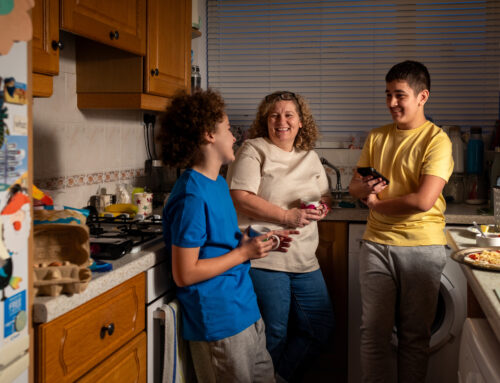10 Healthy Choices Your Teen Needs to See You Making

Parents are perhaps the most influential role models for their children. What you say and do, the healthy habits you practice, and the activities and relationships you prioritize will have a significant impact on your kid’s life and a major influence on children’s decision-making process.
Consider a parent who chooses chips and soda over water and fruit but stresses the importance of hydrating and eating healthy to their children. As a parent, you must be a role model for your child and practice what you preach if you want children to form healthy habits.
Here are 10 healthy choices your teen needs to see you make.
Regularly Exercising
Parents have busy schedules. Balancing family life, full-time jobs, extracurricular activities, and other obligations can make it difficult to find time for a traditional workout. However, it is possible to model an active lifestyle without spending hours at the gym.
Experts recommend finding time for short workouts or establishing fitness routines for busy families, according to WebMD. Consider starting a workout program with your teen or taking 20–30-minute walks every night after dinner.
You can also try stretching or even lifting weights while watching TV — instead of just sitting around. An active lifestyle is associated with better weight control, stronger bones and muscles, and disease prevention.
Prioritizing Sleep
Most adults need seven to eight hours of quality sleep, and teens need eight to 10 hours, according to the U.S. Department of Health and Human Services Office of Disease Prevention and Health Promotion.
Healthy sleeping habits support a strong immune system, reduce stress, improve mood, promote clear thinking, and improve decision-making, among other benefits.
Drinking Plenty of Water
Experts recommend teens drink at least 80 ounces of water per day. Proper hydration promotes healthy skin, improved mood, higher metabolism, better digestion, weight loss, and a host of other benefits.
Consider setting a goal in your family for each member to track water consumption daily and prioritize drinking the appropriate number of glasses per day for each age group. It’s a healthy habit and a fun way to engage with each other.
Bonus: Water from the tap is free and can save families money on sugar-filled sports drinks and soda.
Eating a Healthy Diet
In various studies, researchers have found parents’ dietary choices strongly influence the food habits their children adopt. Studies reveal children’s consumption of fruits and vegetables was influenced most by the amount of fruits and vegetables their parents eat.
Parents are role models, and children who see their parents eating well and enjoying healthy lifestyles are more likely to choose the same for themselves.
Encouraging Family Meals
Regular family meals have proven benefits at every age. It’s a parent’s job to set the expectation that the family eats together regularly.
Family dinners with teens are associated with higher grades in school and reduce the risk of smoking, substance abuse, eating disorders, teen pregnancy, and violence. Meals together also reduce depression and anxiety and improve self-esteem.
Reading and Continuing Education
Make reading a fun family activity to promote curiosity and the joy of lifelong learning. Rather than music, consider playing an audiobook on a long car ride and discussing the book as a family.
Regular trips to libraries, keeping books around the home, and reading to little ones are all ways to promote a love of reading in your home.
No Smoking
The harmful effects of smoking tobacco are well documented. Kids are more likely to avoid experimenting with tobacco if parents don’t use it, and if families have open conversations about the risks associated with smoking.
Drinking Alcohol Responsibly
Parents may choose to drink alcohol on occasion, but it’s important to drink responsibly and model safe drinking habits in front of children.
Explain to teens that alcohol is illegal for anyone under 21 years of age and set a zero-tolerance policy for underage drinking. Talk It Out NC has a wealth of resources to help educate parents and teens on the specific impacts of alcohol on their brains and bodies.
No Tolerance for Impaired Driving
Never operate a vehicle after drinking too much alcohol. Talk to teens about the dangers of drinking and driving or getting in a car with an impaired driver.
Explain the impact alcohol has on a young person’s mind and body and how it’s different for adults. According to the CDC, drivers aged 16 to 20 are 17 times more likely to die in a crash when they have a blood alcohol concentration of .08 percent — the legal limit to drive in North Carolina for adults — than when they have not been drinking.
Communicating Honestly about Alcohol Use and Risks
Talking to your kids about the dangers of underage drinking doesn’t have to be a big production. In fact, experts say ongoing little conversations can be one of the most effective ways to educate children and keep the lines of communication open.
Setting clear expectations and consequences for underage drinking with teens is key to underage drinking prevention. Communicate with them and communicate often.



